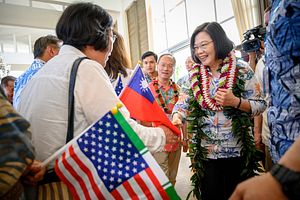On Friday, Taiwan’s President Tsai Ing-wen announced her administration would ease restrictions on imports of American pork and beef, effectively removing one of the major obstacles to a U.S.-Taiwan bilateral free trade agreement.
In a speech at the Presidential Office Building, Tsai said that “to set permissible ractopamine residue levels for imported pork, and ease restrictions on the import of beef from US cattle aged 30 months or older.”
She added, “This decision is based on our national economic interests and consistent with our overall strategic goals for the future.”
Achieving a bilateral trade agreement (BTA) between the U.S. and Taiwan has been a long-held dream among advocates of the overall bilateral relationship. One of the major sticking points has always been Taiwan’s ban on U.S. beef and pork due to the use of the feed additive ractopamine. Permitting the additive is a hot-button political issue in Taiwan, due to food safety concerns; meanwhile, it has been a prerequisite for serious BTA talks. That deadlock between domestic political concerns and U.S. pressure has kept BTA talks a distant dream – until now.
The impetus for the change at the current moment is related to the strategic shifts happening amid the COVID-19 pandemic and heightened U.S.-China competition. Tsai noted that “Taiwan’s economy now stands at a historical turning point” amid “structural changes to the global economy, and … the realignment of global supply chains.” Tsai’s government see this an an opportunity to position Taiwan as a “critical force in the realignment of global supply chains” – and forging a long-dreamed-of BTA with the United States would be a major step toward that goal.
Beyond the geoeconomic moment of opportunity, however, it’s likely that Tsai and her Democratic Progressive Party’s strong showing in the 2020 elections also made the political gamble more feasible. Tsai attempted to head off domestic backlash by maintaining that food safety will be maintained, noting that “we will not make any compromises or concessions” on “national food sanitation standards.” On that front, Tsai pointed to new evidence and data on the safety of ractopamine as a crucial part of the decision.
Tsai’s unilateral move to ease restrictions that have long been a sticking point for U.S. trade negotiators is thus a sign of good faith about Taiwan’s seriousness toward such an agreement. “I trust that if we can take this key step regarding U.S. beef and pork issues, it will be an important starting point for more comprehensive Taiwan-U.S. economic cooperation,” Tsai said.
She also promised to help ensure the move does not negatively impact Taiwan’s pig farmers, who have been adamantly against increasing imports of U.S. pork.
Taiwan’s Representative to the United States Bi-khim Hsiao said in a statement that “President Tsai has demonstrated strong resolve and determination to prepare Taiwan for negotiating a high-quality trade agreement with the United States.” Hsiao added, “It makes both strategic and economic sense for Taiwan and the United States to negotiate a BTA… A trade agreement will create the infrastructure to fortify and deepen the already significant trade relationship between reliable and like-minded partners.”
The reception in the United States has already been positive. The U.S.-Taiwan Business Council called the announcement “the most important development in bilateral relations in the past decade” and urged the U.S. to respond by launching BTA negotiations as soon as possible.” Secretary of State Mike Pompeo tweeted that the U.S. “welcomes” Tsai’s decision, adding that “This move opens the door for even deeper economic and trade cooperation.”
However, there was no immediate response from the Office of the U.S. Trade Representative (USTR), which would be responsible for any BTA talks. U.S.-Taiwan Business Council President Rupert Hammond-Chambers warned that, when it comes to a BTA, “The sticking point will be USTR, which has opposed expanded trade ties with Taiwan since at least 2016. They also place more importance on the China trade relationship, and falsely assume that they must choose between the two.”
Tsai had previously signaled her administration’s strong interest in closer trade relations with the United States during Health and Human Services Secretary Alex Azar’s August visit to Taiwan. Earlier, in March 2020, the U.S. Congress passed a law known as the TAIPEI Act that, among other provisions, called for strengthening the bilateral trade relationship.

































